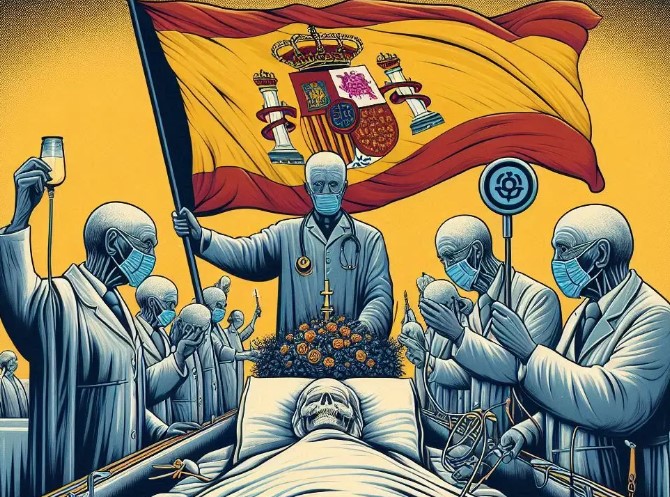In Spain, the Euthanasia Law has been in force for four years. However, a recent assessment by the “Right to Live with Dignity” (DMD) association reveals that only about 40% of applicants, roughly 1,300 out of 3,000 individuals, were actually able to exercise their right to euthanasia. The DMD also laments significant inequality in the law’s application across different autonomous regions.
A quarter of those seeking euthanasia are denied, while another quarter of interested individuals die before their application can be processed. These are alarming figures that underscore the need for better coordination and standardized application of the law.
Regional Disparities and Lack of Data Transparency
Catalonia stands out with the highest figures: in 2024, 358 applications were made and 142 euthanasia procedures were carried out. While these numbers are increasing annually, the differences compared to other communities are “too disparate” according to the DMD. Another issue is the lack of transparency: as of June 2025, less than half of the autonomous communities have published the legally required annual report with 2024 data. Some regions, such as the Canary Islands or the Valencian Community, have not released any data since 2022.
The Ministry of Health reports 960 registered applications and 427 services provided nationwide last year. Over the entire four years since the law came into force, 2,475 applications were submitted and 1,034 procedures performed, corresponding to a 42% approval rate. The DMD considers these quantities “not a large amount of data” and urgently calls on the Ministry and the communities to publish their reports in the first quarter of next year to allow for a more precise assessment of euthanasia in Spain.
Personal Accounts: The Struggle for a Dignified Farewell
The discrepancies are evident not only in the numbers but also in the personal experiences of those affected and their families. For Lucas from Andalusia, the path to a dignified death for his mother, suffering from multiple system atrophy, was a true struggle. She encountered “obstacles and more obstacles” when applying for euthanasia. Lucas reports that the referring doctor even commented: “That is unnatural.”
In stark contrast, Teresa in Catalonia experienced a smoother process with her husband Josep, who had suffered for years from Parkinson’s disease and dementia related to the diagnosis. After the law was passed, they submitted the application, and at Vic Hospital, they found “a lot of willingness” and support. Teresa describes her husband’s farewell as “in the most dignified way, without suffering.” She adds: “Everything was done as he wished, it was an experience full of love, dignity, and serenity.” These differing experiences highlight the need for consistent and empathetic application of the law throughout Spain.
Law Reform Demanded: Swift Solutions for Legal Challenges
The DMD association is pushing for law reform to prevent cases like Noelia and Francesc from having to wait months for their euthanasia because relatives legally challenge the law’s application. The goal is to ensure through legislative changes that such complaints are resolved within a “very short” period. The DMD demands a resolution period of “no longer than 30 days,” as the current average is 7 weeks (49 days) – a period considered “unacceptable” for people in an incurable situation.
As the DMD emphasizes, “forcing a person to continue living against their will in this situation is an attempt against their physical integrity and dignity and amounts to inhumane and degrading treatment and torture.” Ramón Riu, a legal expert in health law, adds: “These are people who are suffering.”
In Noelia’s case, a court in Barcelona issued a ruling on March 14, 2025, stating that the father had no legitimate interest in an appeal and that the Guarantee Commission’s decision complied with the law’s requirements. Nevertheless, the father’s lawyers appealed to the High Court of Catalonia (TSJC), which keeps the application blocked.
Francesc’s application is also blocked after his father challenged his son’s euthanasia. Although a Barcelona court rejected this request in November, the decision was challenged by the public prosecutor’s office, and the father and the TSJC returned the case to the court, allowing the appeal. The DMD points out that the law has a “significant problem” in qualitative terms, even though only four reports have been challenged in court so far.




